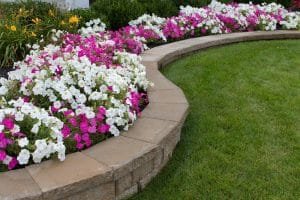 If you are considering building a retaining wall outside of your home or office, you likely have questions about which materials to use. The most common options are stone, brick, and concrete retaining walls. Below, we look at the best option for this job, concrete. We also discuss the pros and cons of using this material as part of the construction.
If you are considering building a retaining wall outside of your home or office, you likely have questions about which materials to use. The most common options are stone, brick, and concrete retaining walls. Below, we look at the best option for this job, concrete. We also discuss the pros and cons of using this material as part of the construction.
What are concrete retaining walls?
Retaining walls satisfy multiple needs on a residential or commercial property. This needs include:
- Correcting ground slope
- Providing level areas for gardening
- Leveling ground for patio construction
- Expanding property area available for enjoyment or other use
Retaining walls must provide enduring strength and weather resistance for proper functioning. The modern choice for these walls is concrete, due to its durability.
Benefits of Concrete Retaining Walls
Advantages of concrete retaining walls include:
Multiple Types of Construction
When building concrete retaining walls, you have the choice of three primary construction methods. These include poured concrete, precast panels or blocks. Your Raleigh, North Carolina area concrete contractor at We Do Concrete Cheap can help you choose the best type for your property and retaining wall needs.
Strength
Concrete is virtually unparalleled in its strength. This material strength is critical when building retaining walls as the wall must hold tons of weight, even against natural elements like wind and water. Over time, they become even stronger as they cure.
Durability
You can expect your concrete retaining walls to last for decades. In fact, many well-constructed walls should last more than a century.
Natural Element Resistance
Your retaining walls constructed of concrete are made for weathering natural elements. They stand up to wind, rain, floods, extreme temperatures, road salts and so much more. In fact, these walls are fireproof. They do not rust or rot, either.
Easy Installation
Your concrete contractor from Dunn, North Carolina’s We Do Concrete Cheap can quickly and easily install your concrete retaining walls. The project timeframe typically takes far less time than for construction of other types of masonry retaining walls under the same conditions. This means you pay less for labor and get to enjoy faster results.
Design and Construction Flexibility
Concrete is an extremely flexible material, when it comes to design and construction options. You can request curves, angles, colors, patterns, ramps, staircases and so much more from your contractor or designer. No longer are you stuck with only the option of gray concrete with straight lines and corners. In fact, you can request that your retaining walls match your building or home, compliment these structures, contrast with other construction elements or blend with the surrounding environment. Your wall can look like natural stone or other materials, too.
Easy Maintenance
Your concrete retaining walls are so easy to maintain. You should have them cleaned or power washed once annually to keep them looking their best. You also need only occasional inspection by your concrete contractor, to ensure there are no cracks, worn areas or other damage. Your We Do Concrete Cheap contractor can make repairs or patch damaged areas using mortar to keep your wall looking new.
Environmentally Friendly
Concrete used to construct your these walls are non-toxic. It also does not emit allergens or harmful chemicals. The bulk of your wall materials come from natural resources sourced in the area or appropriately recycled. These include clay, fly ash, limestone and slag.
Affordability
Concrete retaining wall pricing ranks at the mid-range of retaining wall construction options. But the benefits prove much higher than most of these materials, making the decision to choose concrete a “no-brainer.”
Concrete Retaining Wall Disadvantages
There are two basic disadvantages to concrete retaining walls. But these disadvantages are easily overcome when you work with a qualified and licensed concrete contractor, such as We Do Concrete Cheap in the Triangle Area of North Carolina.
You Cannot DIY Concrete Retaining Walls
You should not DIY your poured concrete, precast panel or block concrete project. Additionally, you need a qualified contractor with local experience. They know how to prevent major structural damage, such as from cracking or bulging. Your precast panel concrete retaining walls also require special equipment for handling the extremely heavy panels.
Structural Limitations
Although concrete is among the most versatile materials for constructing retaining walls, these do have some limits. These include maximum height allowances for concrete block designs, at four feet high if you choose to use blocks instead of poured concrete or precast panel concrete. Also, concrete walls are built to last decades, even more than a century. So if you want to move or tear down the wall in the future, you will need heavy equipment and a means of removing the heavy debris. Of course, all of these problems are easily overcome with the help of expert concrete contractors.
We also do many other concrete services, including concrete patio, concrete slabs, pools, sidewalks, and more. To learn more about how concrete retaining walls can improve your outdoor areas, call the experienced Triangle Area concrete contractors of We Do Concrete Cheap at 919-454-3927.


